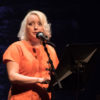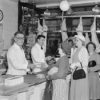The History Lesson
This week back in 1781, a new planet was discovered. Sir William Herschel gave new meaning to the term “the music of the spheres.” Born in Germany, he moved to England as a teen and made a name for himself as a composer. You’re listening to one of his symphonies.
But Herschel was one of those guys who’s always throwing off the grade curve. Once he mastered music, he just had to master math. Which got him interested in astronomy. So interested, that when he couldn’t afford a telescope — he made his own. Soon, his telescopes were considered the best in the country. And on March 13th, 1781, he was using one in his backyard when he spotted what he thought was a comet — turned out it was a planet. The first new one to be discovered in thousands of years.
King George the Third knighted Herschel, set him up with a sweet salary, and asked him to name the new world. Herschel wisely went with “Georgium Sidus” or “George’s Star.” It was the first planet not named after a Roman God. Herschel thought that was appropriate for his enlightened era. Of course, he and other “enlightened” men of the day also thought the sun was probably inhabited. Anyway, the name wasn’t a big hit. Especially with England’s enemies. For a while, the French just called the planet “Herschel.” But 70 years later, even England agreed on the name, Uranus, after the Greek God of the sky.
The Booze
The Astronaughties Deep Space Freeze

Created for the DPD by Dan Boggs at A+ bar in Houston, Texas.
Ingredients:
In a shaker with ice, combine:
- 1 ½ of Ten Cane rum
- dash of maple syrup
- dash of fresh lemon juice
- 3 bar spoonfuls of blueberry puree or concentrate
Instructions:
Shake well, until cold as deep space. Strain into martini glass. Garnish with miniature blue planets, aka blueberries.


